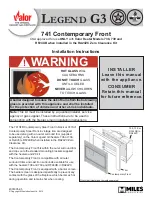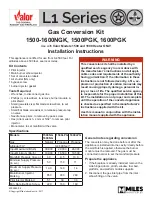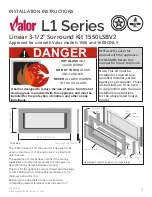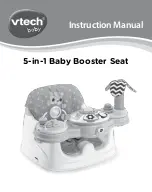
1030D/1030Ds Fluid Head
9
Introduction
The 1030D/Ds fluid head comprises a patented sinusoidal counterbalance mechanism for true
and accurate balance, stepless drag assemblies for ultra-smooth pan and tilt motions. It comes
complete with an adjustable top platform with detachable camera mounting plate, a telescoping
handle, and a 100 mm ball base.
The 1030 head features provisions for mounting a front box and for attaching an eye-piece
leveler or other accessories at the rear.
Counterbalance
The balance mechanism is adjusted by the counterbalance crank on the rear of the head. The
crank has a magnetic folding handle. Maximum and minimum payloads that can be balanced are
dependent on the weight of the camera and accessories, and on the Center of Gravity (C of G)
height. The counterbalance graphs for the 1030 heads show the range of loads and C of G
heights that can be maintained in balance (see pages 12 and 13).
The counterbalance is continuous and can be adjusted all the way to zero (no counterbalance),
and the head can still be tilted within its specified tilt range (see ‘Technical specification’, page 5).
Ultra-smooth fluid drag
Both the pan and tilt mechanisms incorporate OConnor’s patented ultra-smooth fluid drag to
ensure smooth movement. The pan drag adjustment knob and indicator wheel are located on
the left side of the head, below the level bubble, and the tilt drag adjustment knob is located on
the lower right rear of the head with the indicator wheel on the right side end cover.
Both controls are continuously adjustable from 1 through 5.
Pan and tilt locks
Friction locks on each axis allow the head to be locked at any desired position. The pan lock
lever is on the lower left front of the head, at a convenient angle for manual operation, and the
large tilt lock lever sits just above the level bubble on the left side of the head, for easy operation.
The 1030D/Ds has a reversed pan break in comparison to previous versions of the 1030. This
has been done to match the break arrangement of the larger OConnor heads (see ‘Pan and tilt
locks’ on page 14), to further ease the transition from larger payload camera setups to smaller
payload camera setups for the operator.
CAUTION!
1.
Do NOT overcrank or undercrank the crank handle (i.e. wind the crank handle
above or below the end stops). Adjusting the counterbalance crank by force
can seriously damage the head.
2.
Before operating the head, ensure that the crank handle is returned to its
folded position.
Summary of Contents for 1030D
Page 2: ......
Page 3: ...OConnor 1030D 1030Ds Fluid Head Operators Guide Publication Part No C1239 4980 Issue 1 ...
Page 21: ......








































